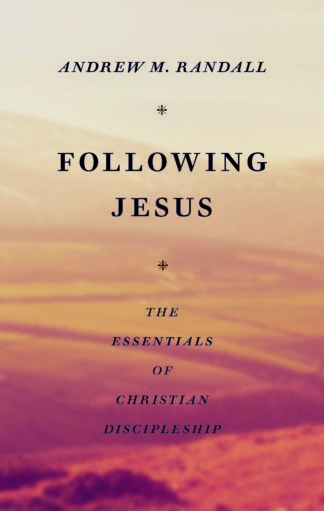True Radicalism
The word ‘radical’ means, literally, ‘of the roots’. Radical changes are changes that go to the root of things, and radical solutions are not merely ‘cosmetic’ but are concerned with the foundations. Recently, and on certain questions, ‘radical’ has come to have a generally favourable flavour. A radical is taken to be uncluttered in his thinking, someone who is honest and who stands for no nonsense. It is in this favourable sense that the word is applied to Christian theology. ‘Radical theology’ is taken to be theology that cuts through the undergrowth of religious cant and double-think and which re-states the ‘essence of religion’ in up-to-date, modern, relevant ways.
It is true that the changes proposed to historic Christianity in such theologising are drastic, but it is doubtful whether they are fit to be called radical (They are certainly not modern, unless the steam-engine is modern. Attempts to re-discover and re-state the essence of the Christian religion have been going on at least since the time of Watt and Stephenson). Such radical thinking is, in fact, rootless. The only tests of truth that are recognised are the values and ideals of the contemporary consciousness. Rather than being rooted in the past, or rooted in truth, radical theology is overwhelmed by the present, and by what is currently acceptable. Put another way, the approach of the radical to religious questions is essentially tactical; he trims to what is currently in vogue (This is not meant to be abusive radicals themselves admit as much). Such thinking lacks a fulcrum, a point of leverage, in terms of which present thought and feeling can be assessed and reformed. Without this, attractive though the radical’s concern for relevance is, he is constantly in danger of being submerged by the ‘spirit of the age’, and of failing to distinguish between a true insight and a gimmick. Without a fulcrum, sustained radical thinking of any kind becomes an impossibility.
I
Radical Christian theology, we must insist, must be radical biblical theology. The Puritans, who saw this, are entitled to be called radical Christian theologians. In exegesis, doctrinal construction, pastoral theology and evangelism, their intention was to get back to Christian roots, not by imagining themselves to be back in the early days of the Church, but by seeking to discern the mind of God in Scripture. Though, of course, they differed greatly as individuals (Bates was not Oliver Heywood, and Charnock was not John Howe) they were, almost to a man, eager, vigorous, restless, learned, Bible students. Their immense literary output is only the tip of the iceberg. Beneath it was a mass of continuous research and reflection. All their powers and resources were focused on the job of getting clear in their minds (and in the minds of their people) the Bible teaching on whatever subject was engaging them, and of applying it in the face of the particular ‘life-style’ of their day.
If called on to choose between the rootless ‘radicalism’ of today and the biblical radicalism of the Puritans there is no doubt which way the Church ought to move. Yet, in sharp contrast to the Puritans, life in most ‘conservative’ churches is at present characterised by inertia. There appears to be no thought that commitment to biblical authority (the ‘Puritan principle’) has radical consequences. Conservatism with respect to the authority of Scripture appears to mean conservatism in everything else. Why is this? Is it a sort of mental shell-shock, numbness because of the various pressures under which the Church lives? Or complacency? Or a fear of getting out of line? Or is all available energy being sapped by activity of the wrong kind? Or is it that, for all the talk, there is no real commitment to biblical authority because of a fear of where it might lead? To the Puritans, commitment to what is today regarded as a ‘conservative’ view of Scripture provided a mandate for facing issues that had long since been shelved or forgotten. That is, issues with respect to the text of Scripture itself. To those who follow them the slogan ‘Reformed’ often seems to serve to stifle legitimate lines of enquiry, matters that careful attention to the text of Scripture inevitably raises. And this at a time when the Church is faced with enormous problems, and an appalling apathy.
Faced with such problems, and such apathy, what ought to stimulate a minister, or anyone who has teaching responsibilities in the churches? At various times different factors seem to have provided the stimulus — the rediscovery of the text of Scripture, missionary expansion, a ‘great awakening’, an obvious need to defend the Christian faith, denominational loyalty. But today the Church faces missionary decline, unconcern over questions of theological truth, the break-up of the old denominations, and an almost total disregard for preaching. Where, in these circumstances, is the stimulus for the ministry to come from? What is to keep a minister going on, year in, year out, as he addresses the same few scores of people? And what is to keep them listening? Ultimately, surely, the ministry can only derive strength and vigour from being stimulated by the text of Scripture, and making available to others, in a forceful, practical way, the fruits of that stimulation. Today, as at no time since the Reformation (and perhaps since the early Church) a minister is cast back on his relationship to the text of the Bible. Social prestige, denominational position or minor eccentricity are no longer sufficient to give the minister a hearing. His credibility, and that of his office, must rest on his ability, as Paul put it, to manifest the truth to every man’s conscience in the sight of God (2 Cor. 4:2). Once this is recognised, a man ought to leave no stone unturned in an effort to get at biblical truth, and to be prompted to fruitful lines of thinking. If a Christian minister cannot ‘open up’ Scripture in an informative and challenging way, why should anyone, in our day, bother to listen to him?
II
When were you last made to think by a writer? When did you last discover something about the meaning of a passage of Scripture that you did not know before? When did you last ponder an exegetical or dogmatic problem for its own sake, and not under the shadow of immediate sermon preparation? When did you last realize that a text whose meaning you took to be obvious, had in fact another meaning entirely? If the line of argument that we have been tracing out is anything like correct, then these kinds of questions are obviously of fundamental importance. Honest answers to them will at once provide an accurate guide of the extent to which a man is being made to think about Scripture. The true Christian radical is concerned to get at the meaning of Scripture, and (if he is a minister) to be led by the text into the pulpit. Nothing less than this is good enough. And so anything that throws light on the text, or that leads to renewed attention to it, is to be welcomed with open arms. How far is the ‘greyness’ of preaching due to men going to books for help, already knowing what help the book is going to give them, and only going to those sources that they know will set their heads nodding in agreement? As a result (for all the talk about expository preaching) the minister simply uses the text as the occasion for some remarks that he has culled from Berkhof or Hodge. The remarks are sound enough, no doubt, but they are not preached from the text. Here is another question to add to the list: When did you last read something that threw fresh light on Scripture from a writer whose general position you did not share?
This may seem outrageous. Surely (someone will object) if a writer holds a position that is in general different from mine he cannot be expected to give me any positive help. This assumption is false. It is false to think that because you do not agree with a man in general you will not receive help from what he says. If that view was taken seriously then it would quickly result in all ministers of one persuasion saying exactly the same things, in the same way (Naturally, it is also false to think that because you do not agree with a man in general you are bound to get help from him. It depends on the case, on the writer, and on the reader). Take an illustration of this. It would be hard to deny that in the study of history Marxists have illuminated many matters. The Marxist, because of his distinctive viewpoint, asks questions that were not asked before, and forces matters on the attention of even non-Marxist historians, stimulating research in neglected areas.
But what about the Bible, and theology? Are they not different?
There is nothing more basic than the truth that the Christian faith needs spiritual illumination in order to be rightly understood and received. It is also true that theological differences are often not just intellectual in character, but have a religious origin. Both these points must be granted, and insisted on. Yet there are ways in which those with a vastly different theological outlook can be used for the positive good of the Church. For instance, they can be informative about matters on which a minister may be ignorant. Any man who thinks that he has all the relevant general knowledge about, say, the grammar of the original writings of Scripture, and the vocabulary, and the historical background, and that what he does not know is not worth knowing, deserves to be treated with suspicion. Yet the uncomfortable fact is that many of the men who, to judge by their writings, are far from historic Christianity are experts in the languages and history of the Bible. Exegetical insight can go with theological error.
Consider another kind of case. Contact with minds with a different training and interests, but which are focussed on the same data, can often be challenging. Accepted positions have to be reflected on, and challenges met, and a new slant given to the familiar. If the Church had worked on the principle that nothing that had its origins outside orthodoxy could be used in the service of orthodoxy she would have been severely impoverished. It goes without saying that watchfulness and great care are needed, but the idea that the Church should (even if she could) be hermetically sealed-off from all non-orthodox influences is quite unrealistic.
It might be said that such facts as these about the past life of the Church do not constitute a very strong argument. Consider, then, these remarks of a trusted theologian: ‘Since under the control of God exegetical good not seldom comes out of critical evil, it has happened here also, that a criticism whose general methods and results we cannot but distrust, has brought to light from the Psalter valuable facts, whose existence had not been previously recognized with sufficient clearness. It cannot be denied that unorthodox criticism has done some valuable pioneer-work in exploring the eschatological views of the Psalter’. 1 Vos is here making an important distinction between a theologian’s exegetical and interpretative remarks on the text in which he draws attention to forgotten facts, and his overall view of Scripture. Vos is recognizing that (as Calvin would say) in the inscrutable providence of God it happens that men whose views are faulty do work that is often of value.
From a higher source still, there is abundant evidence from Scripture that the Church of God has benefited from help from unexpected and unwelcome quarters. Moses’ upbringing, Paul’s education, and the incidents of Abimelech and Abraham (Gen. 20) and Shimei’s cursing of David (2 Sam. 16) come to mind. After all, is it so surprising that the Lord, who makes even the wrath of men to praise him, should do such things?
III
It might be said that this is dangerous and foolish advice. Is it seriously being suggested that ministers ought to leave the standard, trusted authors and wander all over? No, not quite this! Nor is it being suggested that sermons should become learned lectures, peppered with ‘apt’ quotations. Rather, we are trying to establish a point of principle: that ministers should be ruthless in putting to use any material, from whatever quarter, that will help them with the text of Scripture that they are called to expound. They should make this material serve the gospel. And they should use their own judgement, in everything that they read, whether it is Cullman or Calvin, absorbing what they approve and putting it to use in the service of Christ.2 There is no substitute for the use of individual judgement in this way, and one of the desperate needs at present is for men of judgement. It is depressing to find that ministers, who are to appeal to the minds of their hearers, often have no minds of their own, and are constantly pulled this way and that by the tides of ministerial fashion. And it may be that material that is enlightening and stimulating is to be found in unexpected places. How does anyone know that this is not the case until he has looked? If such material leads to positive results, can it be ignored? Ought ministers not to be thorough, using everything that will help them? Perhaps it is forgotten that those whose writings are rightly trusted — the Hodges for example — are only trust–worthy because of their own balance, the result of their wide reading and reflection. The existence of a ministry with a ‘balanced mind’, with a sense of proportion, is one of the greatest safeguards and strengths of the Church. The lack of such a bulwark is being sorely felt at present.
Summarising, the following points have been argued. For thinking to be truly radical, roots are needed, and in the case of Christian theology these roots are in Scripture. A presupposition of Christian radicalism is a sober commitment to the fact of biblical authority, and not just to a slogan about biblical authority. To be active as a radical, reforming the principles of Christian thinking and church life, the Scripture must be ‘opened up’ and its richness, its searching, probing quality uncovered. Any lawful means that serves this end is to be used. Finally, such a radical, reforming attitude demands the development and exercise of sound judgement (the ‘wisdom’ that is the gift of God, according to James). It is in the exercise of this judgement in the interpretation of Scripture that the ministry must gain and hold its position as the under-shepherd of the flock of Christ. ‘Radical conservatism’ may seem like a contradiction in terms. But if what has been argued is correct, such radicalism is the only kind possible. It is this for which the Church, and especially the ministry, should aim, particularly in times like these.
PAUL HELM
This article was first published in the February 1973 edition of the Banner of Truth magazine.
Notes
- Geerhardus Vos, ‘The Eschatology of the Psalter’, Princeton Theological Review 1920. (Reprinted as an appendix in Vos’s The Pauline Eschatology (Eerdmans).
- A glance at the writings of the Puritans will reveal how wide their ‘sources’ were — Church fathers, scholastics, humanists, contemporary continental theologians, Greek philosophers — all were made to ‘serve the truth’.
Of Further Interest

Description
The word ‘radical’ means, literally, ‘of the roots’. Radical changes are changes that go to the root of things, and radical solutions are not merely ‘cosmetic’ but are concerned with the foundations. Recently, and on certain questions, ‘radical’ has come to have a generally favourable flavour. A radical is taken to be uncluttered in his […]

Following Jesus
The Essentials of Christian Discipleship
Description
The word ‘radical’ means, literally, ‘of the roots’. Radical changes are changes that go to the root of things, and radical solutions are not merely ‘cosmetic’ but are concerned with the foundations. Recently, and on certain questions, ‘radical’ has come to have a generally favourable flavour. A radical is taken to be uncluttered in his […]

Description
The word ‘radical’ means, literally, ‘of the roots’. Radical changes are changes that go to the root of things, and radical solutions are not merely ‘cosmetic’ but are concerned with the foundations. Recently, and on certain questions, ‘radical’ has come to have a generally favourable flavour. A radical is taken to be uncluttered in his […]
Latest Articles
Finished!: A Message for Easter 28 March 2024
Think about someone being selected and sent to do an especially difficult job. Some major crisis has arisen, or some massive problem needs to be tackled, and it requires the knowledge, the experience, the skill-set, the leadership that they so remarkably possess. It was like that with Jesus. Entrusted to him by God the Father […]
Every Christian a Publisher! 27 February 2024
The following article appeared in Issue 291 of the Banner Magazine, dated December 1987. ‘The Lord gave the word; great was the company of those that published it’ (Psalm 68.11) THE NEED FOR TRUTH I would like to speak to you today about the importance of the use of literature in the church, for evangelism, […]
